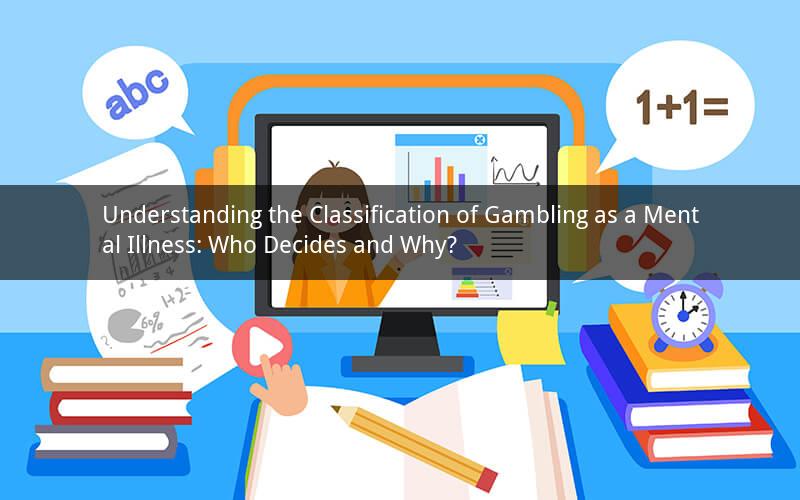
In recent years, gambling has garnered significant attention as a potential mental health issue. While it has long been recognized as an addiction, the classification of gambling as a mental illness has sparked a heated debate. This article delves into the topic of who classifies gambling as a mental illness, exploring the reasons behind this classification and the implications it has for those affected.
The classification of gambling as a mental illness is primarily determined by the World Health Organization (WHO) and the American Psychiatric Association (APA). Both organizations have established criteria that define gambling disorder as a mental health condition. However, the process of classification is not as straightforward as it may seem.
The WHO's classification of gambling as a mental illness is rooted in its comprehensive approach to mental health. The International Classification of Diseases (ICD), which is a medical classification list by the WHO, includes gambling disorder as a mental, behavioral, or neurodevelopmental disorder. This classification is based on the premise that gambling disorder shares certain characteristics with other mental health conditions, such as the presence of repetitive and irresistible urge to gamble, leading to significant distress or impairment in social, occupational, or other important areas of functioning.
The APA also recognizes gambling disorder as a mental illness, which is detailed in its Diagnostic and Statistical Manual of Mental Disorders (DSM-5). The DSM-5 defines gambling disorder as a chronic and progressive condition that is characterized by a pattern of persistent and recurrent maladaptive behaviors related to gambling. This condition is often associated with a desire to "chase" losses, restlessness or irritability when not gambling, and a sense of well-being that is only temporary, often resulting in increased gambling activity.
The classification of gambling as a mental illness has significant implications for individuals struggling with the condition. It provides a framework for diagnosis, treatment, and support services. With this classification, individuals with gambling disorder can seek help from mental health professionals who are trained to treat addictions and other mental health issues. Furthermore, the classification encourages policymakers and healthcare providers to recognize the severity of the problem and allocate resources to address it effectively.
Who decides whether gambling should be classified as a mental illness, and why?
The decision to classify gambling as a mental illness is made by a combination of experts, including mental health professionals, researchers, and policymakers. The WHO and APA are the leading organizations responsible for setting the standards and criteria for mental health disorders. These organizations rely on extensive research and clinical evidence to inform their decisions.
The WHO's ICD-10 and APA's DSM-5 are the two most widely used diagnostic tools in the field of mental health. They are updated periodically to reflect new research and understanding of mental health conditions. The process of revising these manuals involves a collaborative effort among experts from various disciplines, including psychology, psychiatry, and neuroscience.
The reasons for classifying gambling as a mental illness include:
1. Shared characteristics with other mental health disorders: Gambling disorder shares several commonalities with other mental health conditions, such as impulsivity, mood swings, and the potential for substance abuse.
2. Chronic and progressive nature: Like other mental health conditions, gambling disorder can worsen over time if left untreated, leading to severe consequences for the individual's life.
3. Impact on social and occupational functioning: Compulsive gambling can significantly disrupt an individual's personal, professional, and social life, similar to other mental health disorders.
4. Need for specialized treatment: Recognizing gambling as a mental illness allows for the development and implementation of specialized treatment approaches that are tailored to the specific needs of individuals with the disorder.
5. Stigma reduction: The classification of gambling as a mental illness helps to reduce the stigma associated with the condition, making it easier for individuals to seek help and support.
Frequently asked questions about the classification of gambling as a mental illness:
1. Q: Is gambling a mental illness or an addiction?
A: Both. Gambling disorder is classified as a mental illness and an addiction. It is characterized by a combination of compulsive behavior, mood swings, and the potential for significant harm.
2. Q: How does gambling disorder affect individuals?
A: Gambling disorder can have profound effects on an individual's life, including financial, social, and emotional distress. It can lead to relationship problems, job loss, and legal issues.
3. Q: Can gambling disorder be treated?
A: Yes, gambling disorder can be treated effectively through various approaches, such as therapy, support groups, and medication.
4. Q: Who is at risk for developing gambling disorder?
A: Several factors can increase the risk of developing gambling disorder, including a family history of addiction, impulsivity, and certain mental health conditions.
5. Q: How can I seek help for gambling disorder?
A: If you suspect that you or someone you know may have gambling disorder, it is important to seek help from a mental health professional. They can provide an accurate diagnosis and recommend appropriate treatment options.
In conclusion, the classification of gambling as a mental illness is a critical step in recognizing and addressing the problem. It highlights the need for specialized treatment and support services for individuals struggling with gambling disorder. By understanding the factors that contribute to this condition and the available resources for treatment, we can work towards a healthier and more informed society.